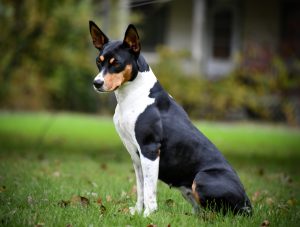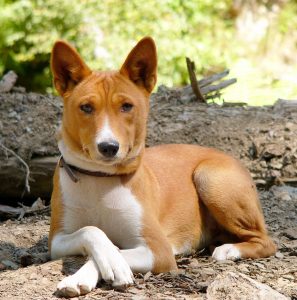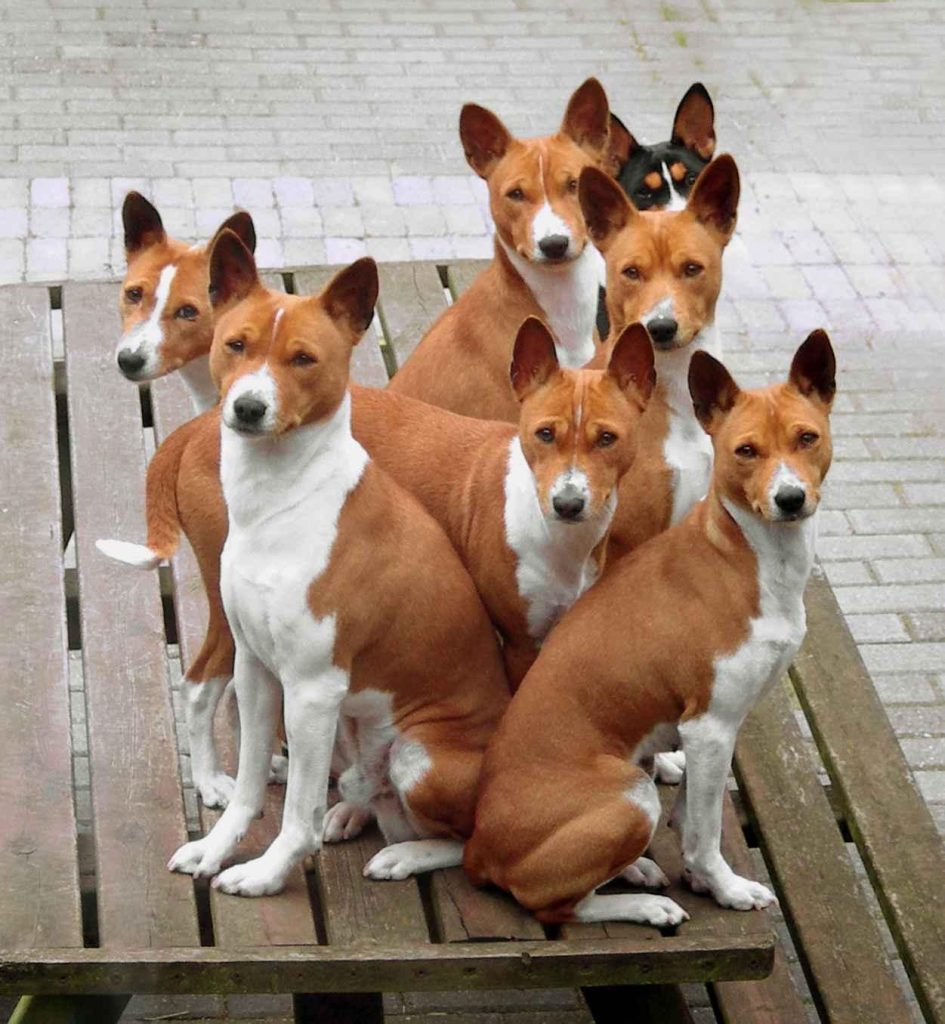Basic information about Basenji Dogs
The Basenji is a unique and ancient breed known for its elegant appearance, distinctive voice, and independent nature. Here’s an overview of the Basenji:
Appearance
Basenjis are medium-sized dogs with a compact and muscular build. They typically stand between 16 to 17 inches (41 to 43 cm) tall at the shoulder and weigh between 22 to 24 pounds (10 to 11 kg).
They have a short, sleek coat that comes in various colors, including red, black, brindle, and tricolor (black and tan with white markings). Basenjis have a distinctive wrinkled forehead and tightly curled tail that rests over their back.
One of the most striking features of the Basenji is its expressive almond-shaped eyes, which convey intelligence and curiosity.
Colours
- Red: Basenjis with a solid red coat are quite common. The shade of red can vary from light to dark, and some may have a slightly deeper hue known as mahogany.
- Black: Basenjis may have a solid black coat, which is less common than red but still recognized by breed standards.
- Brindle: Brindle Basenjis have a mix of black or dark stripes on a lighter background, giving them a striped or streaked appearance. Brindle patterns can vary in intensity and distribution.
- Tricolor: Tricolor Basenjis have a combination of black, tan, and white markings. Typically, they have a black saddle or blanket pattern with tan points on the legs, chest, and face, along with white markings on the chest, feet, and tail tip.
- Black and White: Basenjis may have a predominantly white coat with black markings. The black markings may appear as patches, spots, or ticking throughout the coat.
- Black and Tan: Similar to tricolor, black and tan Basenjis have black saddle markings with tan points on the legs, chest, and face. However, they lack the white markings seen in tricolor Basenjis.

It’s important to note that while these are the standard colors recognized by kennel clubs, Basenjis may also exhibit variations and combinations of these colors. Additionally, coat colors and patterns can change as Basenjis age, with some puppies showing different coloration as they mature.
Temperament
Basenjis are known for their independent, intelligent, and curious nature. They are often described as cat-like in their behavior, as they are clean, aloof, and may groom themselves like cats.
While Basenjis are affectionate with their families, they can also be aloof or reserved with strangers. They are not typically recommended for novice dog owners due to their strong-willed and independent personality.
Basenjis are energetic and playful dogs that enjoy engaging in activities like chasing, exploring, and hunting. They have a keen sense of smell and are excellent hunters, known for their ability to track prey silently.
History
The Basenji is one of the oldest known dog breeds, with roots tracing back to ancient Egypt. Basenjis were highly valued for their hunting abilities and were often depicted in ancient Egyptian art.
The breed was later introduced to Central Africa, where it became known as the “barkless dog” due to its unique yodel-like vocalization instead of traditional barking. This feature made them valuable hunting companions, as they could track prey silently.
Basenjis were brought to Europe and North America in the early 20th century, where they gained popularity as exotic and unique pets. They were recognized by the American Kennel Club (AKC) in 1943.
Care
Basenjis have low grooming needs due to their short coat, which requires minimal brushing to remove loose hair and maintain its sleek appearance.
Despite their relatively small size, Basenjis are active and energetic dogs that require regular exercise to prevent boredom and destructive behavior. Daily walks, play sessions, and opportunities to explore are essential for their physical and mental wellbeing.
Basenjis are intelligent and independent, which can make training a challenge. Positive reinforcement techniques and consistency are key to successful training with this breed. Early socialization is also important to help them develop good manners and adaptability.

Overall, the Basenji is a unique and fascinating breed with a rich history and distinctive traits. While they may not be the best choice for every owner, those who appreciate their independent nature and unique vocalizations will find them to be loyal and affectionate companions.
More posts you might be interested in:

